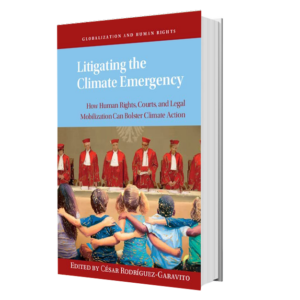
As the climate crisis intensifies and becomes acutely visible, promising responses have been developed by scientists, advocates, and scholars around the world. Mobilizations such as #FridaysforFuture and Extinction Rebellion are converging with Indigenous peoples’ movements and other social justice movements to convey the urgency and the scale needed for climate action. Reports by the Intergovernmental Panel on Climate Change, informed by developments in attribution science, establish more precise links between greenhouse gas emissions, extreme weather events, and human impacts. In the meantime, collaborations between scientists and journalists have drawn the broader public’s attention to detailed information about the magnitude of planet-warming emissions associated with the activities of major fossil fuel companies.
In this edited volume, we explore a specific advocacy and regulatory tool that is gaining momentum around the world: human rights–based climate change (HRCC) litigation. Brought before national and international judicial and quasi-judicial bodies – from domestic courts to regional courts to UN human rights bodies – a growing wave of cases lays bare the profound impacts that a warming planet has on basic rights, such as the rights to life, health, and physical integrity of the victims of floods, fires, heat waves, and other extreme weather events; the right to housing and family life of the up to a billion human beings that may become climate refugees by 2050; and the whole range of rights of young people and future generations that may inherit an uninhabitable planet if carbon emissions are not urgently and drastically cut, in line with the recommendations of the IPCC and the goals of the Paris Climate Agreement.
The increasing use of human rights norms and litigation to advance climate action was not a foregone conclusion. Rather, it is a remarkable development, given the litany of failed efforts to create linkages between human rights and climate action in international law, starting with the omission of human rights in the landmark Rio Declaration of 1992. It took over two decades for human rights impacts to be recognized in a major international climate agreement (the 2015 Paris Agreement). The trend in climate litigation is striking also because human rights organizations were relatively slow to take on climate change. In fact, both in international law and domestic advocacy, it was environmental organizations that took the lead in bringing human rights frames and norms to bear on efforts against global warming.
Table of Contents
PART I THE RIGHTS TURN IN CLIMATE LITIGATION
1. Litigating the Climate Emergency: The Global Rise of Human Rights–Based Litigation for Climate Action, César Rodríguez-Garavito
2. The Social and Political Life of Climate Change Litigation: Mobilizing the Law to Address the Climate Crisis, Lisa Vanhala
PART II LEGAL STRATEGY IN RIGHTS-BASED CLIMATE LITIGATION
3. Thinking Strategically about Climate Litigation, Ben Batros and Tessa Khan
4. The Quest for Butterfly Climate Adjudication, Catalina Vallejo Piedrahíta and Siri Gloppen
5. Climate Litigation through an Equality Lens, James A. Goldston
6. Two Reputed Allies: Reconciling Climate Justice and Litigation in the Global South, Juan Auz
7. Staying within Atmospheric and Judicial Limits: Core Principles for Assessing Whether State Action on Climate Change Complies with Human Rights, Sophie Marjanac and Sam Hunter Jones
8. Litmus Tests as Tools for Tribunals to Assess State Human Rights Obligations to Reduce Greenhouse Gas Emissions, Ashfaq Khalfan
9. The Farmer or the Hero Litigator? Modes of Climate Litigation in the Global South, Jolene Lin and Jacqueline Peel
10. The Impacts of High-Profile Litigation against Major Fossil Fuel Companies, Joana Setzer
PART III BEYOND THE LAW: SCIENCE AND NARRATIVES IN RIGHTS-BASED CLIMATE LITIGATION
11. Climate Science and Human Rights: Using Attribution Science to Frame Government Mitigation and Adaptation Obligations, Michael Burger, Jessica Wentz, and Daniel J. Metzger
12. The Evolution of Corporate Accountability for Climate Change, Richard Heede
13. Providing Evidence to Support Strategic Climate Enforcement and Litigation, Reinhold Gallmetzer
14. The Case for Climate Visuals in the Courtroom, Kelly Matheson
15. The Story of Our Lives: Narrative Change Strategies in Climate Litigation, Laura Gyte, Violeta Barrera, and Lucy Singer
PART IV THE CLIMATE EMERGENCY ON TRIAL: HUMAN RIGHTS AND CLIMATE LITIGATION AROUND THE WORLD
16. Courts, Climate Action, and Human Rights: Lessons from the Friends of the Irish Environment v. Ireland Case, Victoria Adelmant, Philip Alston, and Matthew Blainey
17. Closing the Supply-Side Accountability Gap through Climate Litigation, Michelle Jonker-Argueta
18. Climate Litigation before International Tribunals: The Six Portuguese Youth v. 33 Governments of Europe Case before the European Court of Human Rights, Gerry Liston and Paul Kingsley Clark
19. Is There a Brazilian Approach to Climate Litigation? The Climate Crisis, Political Instability, and Litigation Possibilities in Brazil, Julia Mello Neiva and Gabriel Mantelli
20. Climate Change Litigation in India: Its Potential and Challenges, Arpitha Kodiveri
21. The Tide of Climate Litigation Is upon Us in Africa, Pooven Moodley
22. Pakistan: A Good Story That Can Go Awry If Shortcomings Remain Unacknowledged, Waqqas Ahmad Mir


